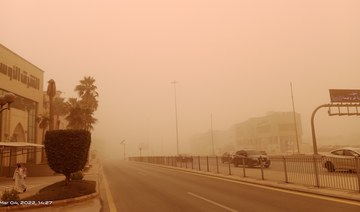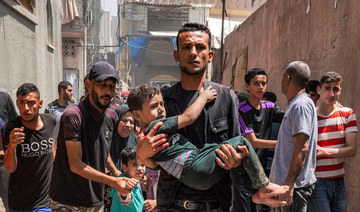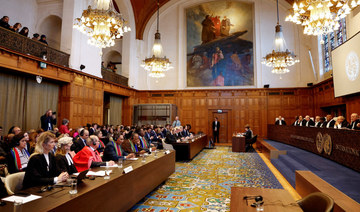BARCELONA, Spain: A huge dust storm swirling over Europe from the Sahara desert made it hard to breathe in large parts of Spain for a second straight day on Wednesday.
The storm also gave cleaning crews extra work as far away as Paris, London and Belgrade to remove the film of dirt falling on cars and buildings.
Europeans woke up to eerie skies, from the grimy gray in Madrid to orange-hues in the Swiss Alps, caused by the tiny particles that had traveled thousands of kilometers across the Mediterranean Sea.
The European Union’s Copernicus Atmosphere Monitoring Service said it was tracking the large mass of dust that has “degraded air quality across large parts of Spain, Portugal and France.”
While Spain is bearing the brunt of the storm, dust was flung far beyond, dumping ochre-colored blobs on cars in a rainy Paris and sifting a fine powder down on a huge swath of the continent.
Experts, including Spain’s national weather service, described the event as “extraordinary” for the amount of dust in the air but noted that it had not broken any records.
“This is an intense event, but this type of event typically occurs once or twice a year, normally in February or March, when a low-pressure system over Algeria and Tunisia gathers up dust and carries it north to Europe. Dust can reach the UK, or even Iceland, as it did last year,” Carlos Pérez García, a researcher studying atmospheric dust at the Barcelona Supercomputing Center, told The Associated Press.
The area of Spain rated by its national air quality index as “extremely unfavorable” — its worst rating — expanded from the start of the European event on Tuesday to include most of the nation’s southern and central regions, including Madrid and other major cities like Seville.
Authorities recommended for people to wear face masks — still in wide use because of the pandemic — and avoid outdoor exercise, especially for those people suffering respiratory diseases. Emergency services for Madrid told the AP that so far there had been no increase in calls for care to people with breathing problems.
Visibility was reduced for a large part of Spain. Municipal cleaners swept up the dust from city streets. In Spain’s south, the dust mixed with rain to produce mud.
Curious photos and videos of the dust popped up on social media, including snowboarders cutting beautiful white lines through the red-tinged snow in the Pyrenees Mountains.
Rubén del Campo, spokesman for Spain’s weather service, said that largest quantities of air-born dust will accumulate on Wednesday afternoon in Spain’s southeast and central regions.
“The air will then begin to clear little by little, although some floating dust will reach the Canary Islands (in the Atlantic Ocean) over the weekend,” Del Campo said.
To the relief of farmers, the storm front that pulled in the African dust is also forecast to bring more rain over the coming days to Spain’s parched fields and descending reservoirs.
In Switzerland, skiers cut through orange-tinted snows on the Alpine slopes of the Pizol resort near tiny Liechtenstein, while reddish-hued skies loomed over places like the Payerne Air Base near Lake Neuchatel.
The national weather service, MeteoSwiss, said aerosols regularly swoop up dust from the Sahara and the one that began Tuesday is the third recorded this year and most dramatic. Light from the sky was tinted yellowish-orange in Geneva as weather forecasters predicted skies would stay colored for several days.
The Serbian capital woke up Wednesday covered in a thick layer of yellow-color dust that covered pavements and parks after a light rain that fell overnight.
Belgrade, which already is one of the most polluted capitals in Europe because of Serbia’s coal-powered electric plants and factories, has recorded “hazardous” air quality, according to AirVisual. Environmentalists said it is the result of the dust cloud, but also because of Serbia’s perennial pollution problems.
The dust cloud reached as far as London and southeast England Wednesday, and some of the dust settled on people’s windows and car windscreens as rain brought the particles down to ground level.
“It’s about as strong as it gets, as far as Saharan dust crossing to the UK,” said meteorologist Alex Burkill at the Met Office. “Rain has washed the dust from higher up in the atmosphere and brought it down to the surface, that’s why people are seeing it on their windows.”
He added that most people will not see any health impact but some may experience irritation in the eyes or a sore throat.
Saharan dust storm covers Spain, spreads out across Europe
https://arab.news/g8uby
Saharan dust storm covers Spain, spreads out across Europe
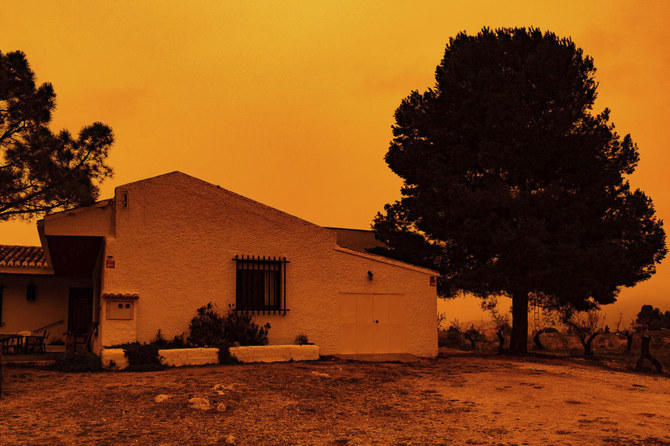
- Europeans woke up to eerie skies, from the grimy gray in Madrid to orange-hues in the Swiss Alps
- While Spain is bearing the brunt of the storm, dust was flung far beyond, dumping ochre-colored blobs on cars in a rainy Paris and sifting a fine powder down on a huge swath of the continent
Gunman kills six in attack on Afghan mosque – Taliban spokesman
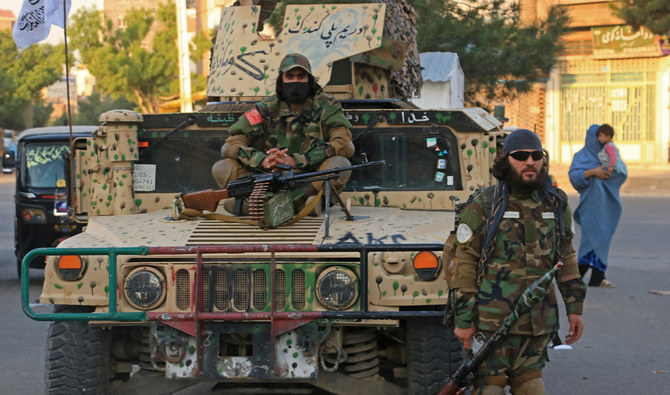
- Locals say the mosque served the minority Shiite community just south of the Afghan city of Herat
- While no group has claimed the attack, the regional chapter of Daesh is viewed as threat in Afghanistan
HERAT: A gunman stormed a mosque in western Afghanistan and killed six people, a government spokesman said Tuesday, with local residents claiming the minority Shiite community had been targeted.
Interior ministry spokesman Abdul Mateen Qani said that “an unknown armed person shot at civilian worshippers in a mosque” in Herat province’s Guzara district on Monday at around 9:00 p.m. (1630 GMT).
“Six civilians were martyred and one civilian was injured,” he wrote on social media platform X early Tuesday morning.
Locals said the mosque served the minority Shiite community in a district just south of the provincial capital of Herat city, and the imam and a three-year-old child were among those killed.
They also said a team of three gunmen staged the attack, contradicting the official account.
“One of them was outside and two of them came inside the mosque, shooting the worshippers,” said 60-year-old Ibrahim Akhlaqi, the brother of the slain imam. “It was in the middle of the prayers.”
“Whoever was in the mosque has either been martyred or wounded,” added 23-year-old Sayed Murtaza Hussaini.
While no group has claimed the attack, the regional chapter of Daesh is the largest security threat in Afghanistan and has frequently targeted Shiite communities.
The Taliban government has pledged to protect religious and ethnic minorities since returning to power in August 2021, but rights monitors say they’ve done little to make good on that promise.
The most notorious attack linked to Daesh since the Taliban takeover was in 2022, when at least 53 people — including 46 girls and young women — were slain in the suicide bombing of an education center.
Taliban officials blamed Daesh for the attack, which happened in a Shiite neighborhood of the capital Kabul.
Afghanistan’s new rulers claim to have ousted Daesh from the country and are highly sensitive to suggestions the group has found safe haven there since the withdrawal of foreign forces.
Taliban authorities have frequently given death tolls lower than other sources after bombings and gun attacks, or otherwise downplayed them, in an apparent attempt to minimize security threats.
A United Nations Security Council report released in January said there had been a decrease in Daesh attacks in Afghanistan because of “counter-terrorism efforts by the Taliban.”
But the report said Daesh still had “substantial” recruitment in the country and that the militant group had “the ability to project a threat into the region and beyond.”
Daesh chapter spanning Afghanistan, Pakistan and Central Asia claimed responsibility for the March attack on the Crocus City Hall concert venue in Moscow, killing more than 140 people.
It was the deadliest attack in Russia in two decades.
China says Palestinian rivals Hamas and Fatah met for talks in Beijing
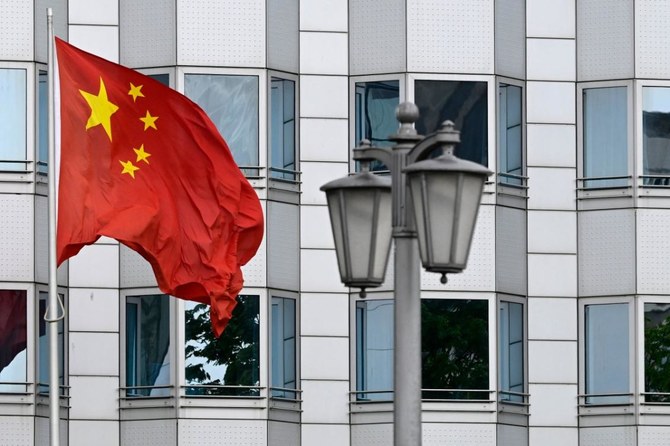
BEIJING: China said Tuesday that rival Palestinian groups Hamas and Fatah met in Beijing recently for “in-depth and candid talks on promoting intra-Palestinian reconciliation.”
“Representatives of the Palestine National Liberation Movement and the Islamic Resistance Movement recently came to Beijing,” foreign ministry spokesman Lin Jian said, referring to the groups by their formal names.
“The two sides fully expressed their political will to achieve reconciliation through dialogue and consultation, discussed many specific issues and made positive progress,” he added, without specifying when the sides had met.
Islamist movement Hamas seized control of the Gaza Strip in 2007 after ferocious fighting with its rivals in Fatah, which maintains partial administrative control in the Israeli-occupied West Bank through the Palestinian Authority.
China has historically been sympathetic to the Palestinian cause and supportive of a two-state solution to the Israeli-Palestinian conflict.
Beijing has been calling for an immediate ceasefire since the start of the current Israel-Hamas war in October last year, when attacks by the militant group resulted in the deaths of about 1,170 people in Israel, mostly civilians, according to an AFP tally based on Israeli official figures.
Israel’s retaliatory offensive has killed at least 34,535 people in the Gaza Strip, mostly women and children, the health ministry in the Hamas-run territory said on Tuesday.
Beijing said on Tuesday the two factions had “agreed to continue this process of dialogue with a view to achieving Palestinian unity at an early date.”
“The two sides highly appreciated China’s firm support for the just cause of the Palestinian people to restore their legitimate national rights,” Lin said.
He did not identify the representatives from Hamas and Fatah who met in Beijing.
Chinese President Xi Jinping has called for an “international peace conference” to resolve the fighting.
In November, Beijing hosted a delegation of diplomats from Arab and Muslim-majority nations, in which Foreign Minister Wang Yi warned a “humanitarian disaster” was unfolding in Gaza.
The heatwave baking parts of Asia
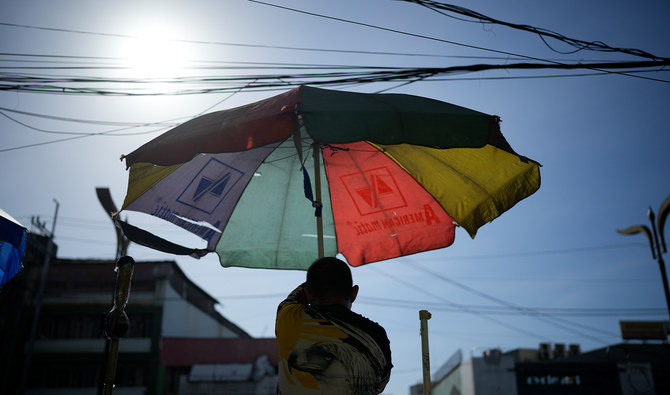
- Record temperatures from Myanmar to Philippines force millions of children to stay home from school
- Experts say climate change causing more frequent heatwaves that are more intense, last longer
BANGKOK: Large swaths of Asia are sweltering through a heatwave that has topped temperature records from Myanmar to the Philippines and forced millions of children to stay home from school.
Here are some questions and answers about the extreme heat, which scientists warn will become more frequent and intense because of human-induced climate change.
The heat has hit much of South and Southeast Asia, with record temperatures in Myanmar’s Chauk and the Philippine capital Manila in recent days.
Thai authorities have issued warnings about “severe conditions,” while authorities in Cambodia, Myanmar, Vietnam, India and Bangladesh all forecast temperatures above 40 degrees Celsius (104 degrees Fahrenheit).
The Philippines and Bangladesh both suspended in-person classes, while India is reviewing whether heat has affected turnout in national elections.
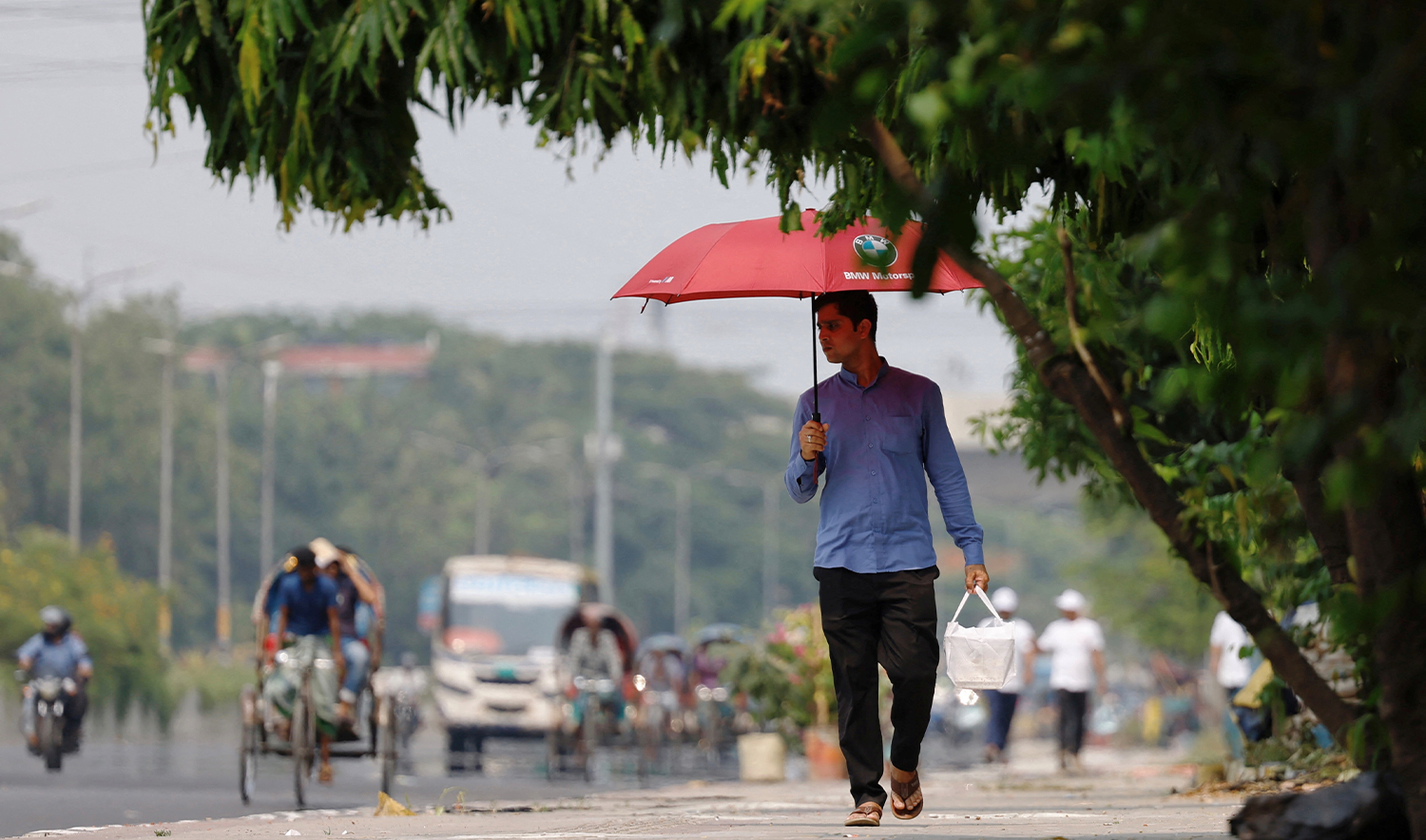
Even northern Japan has been affected: temperatures in Japan’s Sapporo this month passed 25C (77F) at the earliest point of any year on record.
The months preceding the region’s monsoon, or rainy season, are usually hot but temperatures this year are well above average in many countries.
Experts say climate change is causing more frequent heatwaves that are more intense and last longer.

Asia is also warming faster than the global average, according to the World Meteorological Organization, a UN agency.
And the El Nino weather phenomenon is playing a role this year, said Milton Speer, a meteorologist and visiting research fellow at the University of Technology Sydney.
“The lack of cloud in El Ninos means that temperatures are likely to be higher on average,” he told AFP.
Sea surface temperatures in the region are currently several degrees Celsius above normal, “which helps keep the temperatures higher than average inland overnight.”
“So daytime temperatures start climbing from a higher base.”
There are other factors at play too, including deforestation that reduces shade and increases dry surface area, and the urban heat island effect, where concrete, glass and steel structures absorb rather than reflect heat.
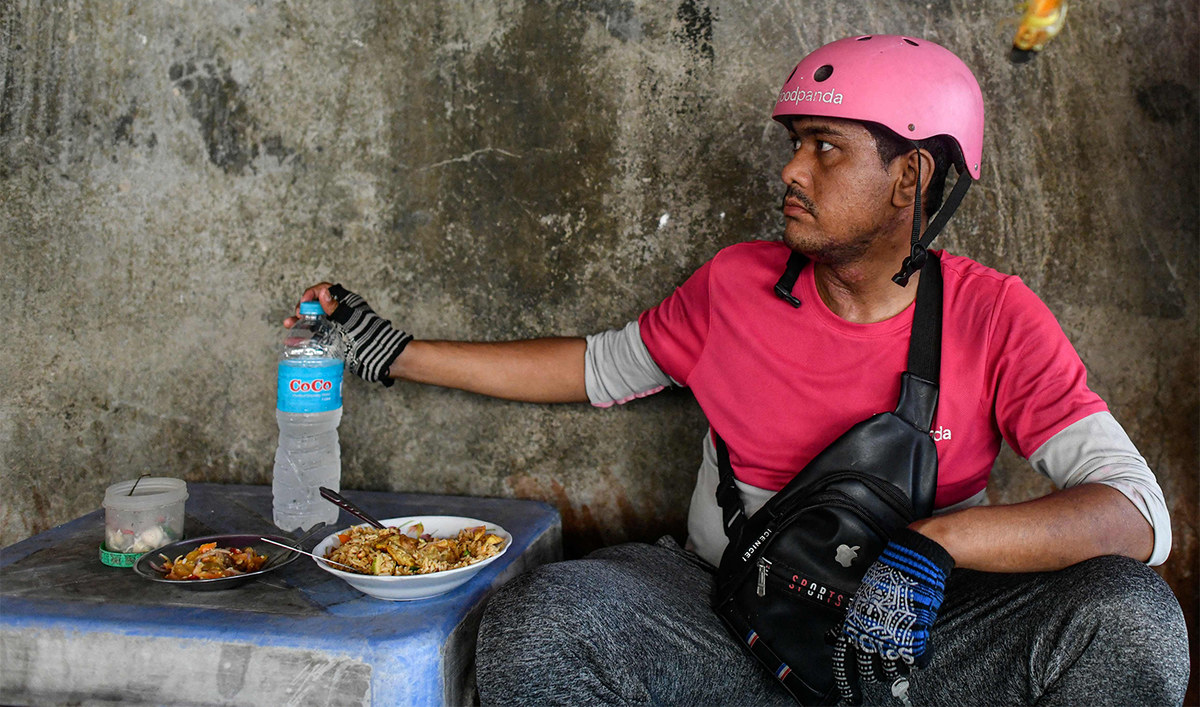
Extreme heat disproportionately affects children, the elderly and those living in poverty.
Children, older people and those with pre-existing conditions or disabilities can overheat more quickly.
Those living in poverty also often lack cooling solutions at home or are forced to work in conditions without adequate heat protection.
The UN children’s agency UNICEF warned this month that 243 million children across the Pacific and East Asia are at risk from heatwaves.
“Child exposure to heatwaves leads to heat stress,” said Salwa Aleryani, health specialist for UNICEF’s regional East Asia and Pacific office.
“Severe issues can develop, such as cardiovascular diseases, organ failure, muscle and nerve dysfunction,” she told AFP.
Authorities in several countries asked citizens to stay at home. Hospitals in Nepal were put on standby, while Cambodian officials asked public schools to keep doors and windows open for ventilation.
Measures went further in Bangladesh and the Philippines, with schools closed for days.
But many children will not have cooler conditions at home, warned Aleryani.
They may also be left unsupervised by parents who cannot afford to stay home from work, and risk serious interruptions to their education.
The heat in Bangladesh is not expected to recede until Thursday at the earliest, and in Thailand forecasters warned that annual rains may arrive in late May, several weeks later than normal.
Speer said the overall warming trend will continue even when the region’s monsoon arrives to lower temperatures.
“Heatwaves will continue to happen more often because the oceans and atmosphere are gradually heating up due to global warming,” he said.
That in turn poses growing risks to crops and livestock, as well as humans whose jobs require them to work outdoors.
Adaptation will be crucial, including offering “sustainable neighborhood structures with air conditioning where people could go during the day and sleep at night,” Speer said.
The Taliban are working to woo tourists to Afghanistan
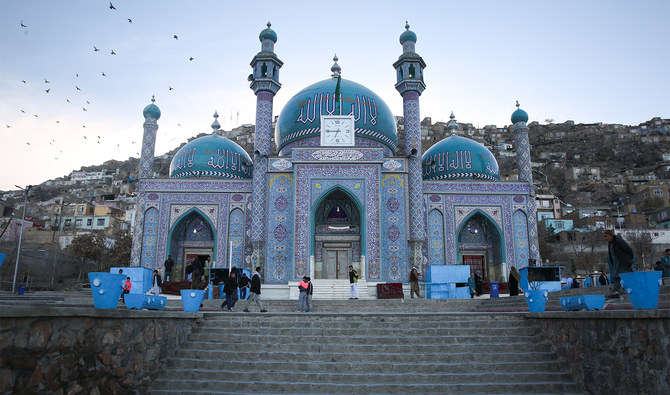
- Foreigners encouraged by sharp drop in violence, increased flight connections to hubs like Dubai are visiting Afghanistan
KABUL, Afghanistan: Around 30 men are crammed into a Kabul classroom, part of the debut student cohort at a Taliban-run institute training tourism and hospitality professionals.
It’s a motley crew. One student is a model. Another is 17 and has no job history.
The students vary in age, education level and professional experience. They’re all men — Afghan women are banned from studying beyond sixth grade — and they don’t know anything about tourism or hospitality. But they are all eager to promote a different side of Afghanistan. And the Taliban are happy to help.
Afghanistan’s rulers are pariahs on the global stage, largely because of their restrictions on women and girls. The economy is struggling, infrastructure is poor, and poverty is rife.
And yet, foreigners are visiting the country, encouraged by the sharp drop in violence, increased flight connections with hubs like Dubai, and the bragging rights that come with vacationing in an unusual destination. The numbers aren’t huge — they never were — but there’s a buzz around Afghan tourism.
In 2021, there were 691 foreign tourists. In 2022, that figure rose to 2,300. Last year, there were 7,000.
Mohammad Saeed, the head of the Tourism Directorate in Kabul, said the biggest foreign visitor market is China because of its proximity and large population. Afghanistan also has advantages over some of its neighbors.
“They’ve told me they don’t want to go to Pakistan because it’s dangerous and they get attacked. The Japanese have said this to me also,” Saeed said. “This is good for us.”
But there are disadvantages, too.
Visas are difficult and expensive to access. Many countries severed ties with Afghanistan after the Taliban returned to power, and no country recognizes them as the legitimate rulers of the country.
Afghan embassies either closed or suspended their operations. There’s an ongoing power struggle between Afghanistan’s embassies and consulates staffed by people from the former Western-backed administration, and those under the Taliban administration’s full control.
Saeed concedes there are obstacles for Afghan tourism to develop but said he was working with ministries to overcome them.
His ultimate aim is to have a visa on arrival for tourists, but that could be years away. There are problems with the road network, which is half-paved or non-existent in some parts of the country, and airlines largely avoid Afghan airspace.
The capital Kabul has the most international flights, but no Afghan airport has direct routes with major tourist markets like China, Europe, or India.
Despite the challenges, Saeed wants Afghanistan to become a tourism powerhouse, an ambition that appears to be backed by the Taliban’s top leaders.
“I have been sent to this department on the instructions of the elders (ministers). They must trust me because they’ve sent me to this important place.”
The students also have aspirations. The model, Ahmed Massoud Talash, wants to learn about Afghanistan’s picturesque spots for Instagram posts and its history for media appearances.
Business school graduate Samir Ahmadzai wants to open a hotel but thinks he should know more about tourism and hospitality first.
“They hear that Afghanistan is backwards, poverty and all about war,” said Ahmadzai. “We have 5,000 years of history. There should be a new page of Afghanistan.”
Classes include Afghan handicrafts and anthropology basics.
An unofficial subject is how to interact with foreign women and how their behavior or habits could clash with local customs and edicts. Examples might be women smoking or eating in public, to mixing freely with men who are not related to them by blood or marriage.
The Taliban have imposed a dress code for women and requirements for them to have a male guardian, or mahram, when they travel. Dining alone, traveling alone, and socializing with other women in public have become harder. With gyms closed to women and beauty salons banned, there are fewer places where they can meet outside the home.
In a sign that the country is preparing for more overseas visitors, the country’s only five-star hotel, the Serena, has reopened its women’s spa and salon for foreign females after a monthslong closure.
Foreigners must show their passport to access services. Women with “born in Afghanistan” on their ID are barred.
The restrictions on Afghan women and girls weigh on overseas travel companies, who say they try to focus on the positive aspect of cultural interactions by making donations, supporting local projects or only visiting family-run businesses.
Shane Horan, the founder of Rocky Road Travel, said visiting Afghanistan should not be seen as an endorsement of any particular government or political regime.
“Ultimately, the goal should be to support responsible tourism practices that contribute positively to the local economy and foster mutual respect and understanding, while also remaining cognizant of the broader political context in Afghanistan.”
He said there was no input from authorities about what tour groups saw or did, and that the company worked closely with a women’s rights organization in Afghanistan. A percentage of the tour cost went into supporting this organization’s programs, Horan added.
There are no women at the Institute of Tourism & Hotel Management. The students don’t mention it. But an official at the Tourism Directorate does.
“It’s a heartbreaking situation,” said the official, who wished to remain anonymous for fear of reprisals. “Even female family members ask if they can study here. But there was a change in policy with the change in government. The women who were studying before (the takeover) never came back. They never graduated.”
Top UN court to rule in Germany ‘genocide’ case over Gaza

- Israel has killed at least 34,488 people in Gaza, mostly women and children, according to the Hamas-run territory’s health ministry
- Press reports have identified a battalion called the Netzah Yehuda, composed mainly of ultra-Orthodox Jews, as being accused of abuses. It is about 1,000-strong and since 2022 has been stationed in the West Bank, which Israel has occupied since 1967
THE HAGUE: The United Nations’ top court will on Tuesday rule on charges by Nicaragua that Germany is breaching the 1948 Genocide Convention by supplying arms to Israel for the Gaza war.
Nicaragua has hauled Germany before the International Court of Justice (ICJ) to demand that judges impose emergency measures to stop Berlin from providing Israel with weapons and other assistance.
More than 34,000 people have been killed in the Palestinian territory since war broke out in October following a cross-border attack by Hamas that left around 1,170 Israelis dead.
The ICJ in The Hague is scheduled to issue an order at 3:00 p.m. (1300 GMT).
Nicaragua targeted Germany rather than Israel’s main ally, the United States, because Washington did not recognize the ICJ’s jurisdiction in the case, Managua’s lawyers have said.
They say Israel is in breach of the 1948 Genocide Convention.
Top lawyers from the two countries clashed earlier this month at the court, with Nicaragua saying Germany was “pathetic” to be both providing weapons to Israel and aid to Gazans.
Berlin retorted that Israel’s security was at the “core” of its foreign policy and argued that Nicaragua had “grossly distorted” Germany’s supply of military aid to Israel.
“Germany only supplies arms based on a meticulous scrutiny that far exceeds the demands of international law,” said Tania von Uslar-Gleichen, a German representative to the ICJ.
Those supplies are “subject to a continuous evaluation of the situation on the ground,” she added.
“The moment we look closely, Nicaragua’s accusations fall apart,” Christian Tams, another representative for Germany, told the court.
Nicaragua requested five emergency measures, including that Germany “immediately suspend its aid to Israel, in particular its military assistance including military equipment.”
The war began with an unprecedented Hamas attack that resulted in the deaths of about 1,170 people in Israel, according to an AFP tally of Israeli official figures.
Israel vowed to destroy Hamas, with a retaliatory offensive that has killed at least 34,488 people in Gaza, mostly women and children, according to the Hamas-run territory’s health ministry.
Cases relating to the Gaza war brought before the ICJ are closely followed.
In another procedure, South Africa has accused Israel — which like the US is not a member of the court — of perpetuating genocide in the Gaza Strip.
Israel “categorically” denies the South African accusations, which include responsibility for starvation.
In that case, the court called on Israel to do everything in its power to prevent genocide and recently ordered the country to “ensure urgent humanitarian assistance” in Gaza without delay.
Even though ICJ decisions are binding, the court has no mechanism to enforce them.
For example, it ordered Russia to cease its invasion of Ukraine, in vain.






